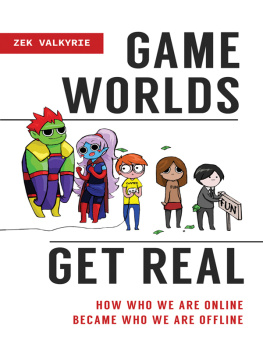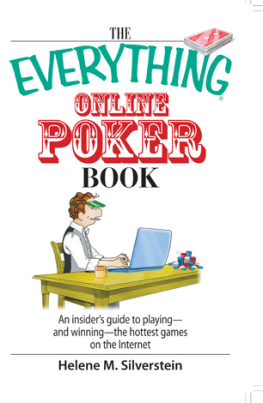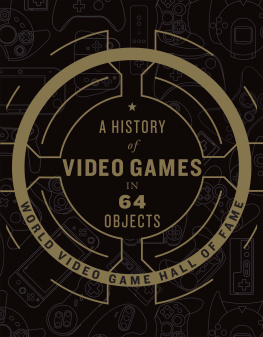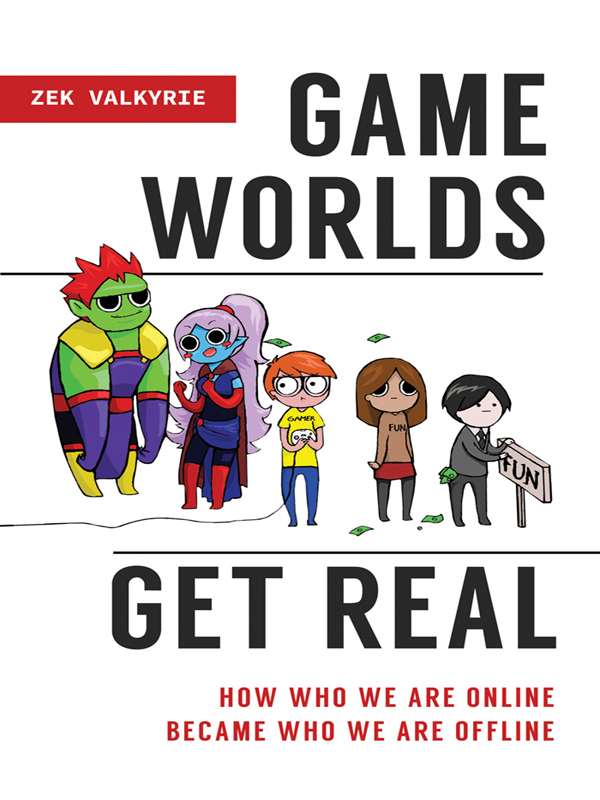GAME WORLDS GET REAL
Copyright 2017 by Zek Valkyrie
All rights reserved. No part of this publication may be reproduced, stored in a retrieval system, or transmitted, in any form or by any means, electronic, mechanical, photocopying, recording, or otherwise, except for the inclusion of brief quotations in a review, without prior permission in writing from the publisher.
Library of Congress Cataloging in Publication Control Number: 2017008541
ISBN:978-1-4408-5128-5
EISBN: 978-1-4408-5129-2
21 20 19 18 171 2 3 4 5
This book is also available as an eBook.
Praeger
An Imprint of ABC-CLIO, LLC
ABC-CLIO, LLC
130 Cremona Drive, P.O. Box 1911
Santa Barbara, California 93116-1911
www.abc-clio.com
This book is printed on acid-free paper 
Manufactured in the United States of America
Contents
S omething strange happened when it came time to write this little piece of the book. I realized that despite having spent multiple years in higher education (as a student and as a teacher), when I looked back at the people who ultimately helped this book project take shape, I realized there was no one. Typically, acknowledgment sections for academic types read a bit like an award acceptance speech, making note of every graduate or undergraduate student who had been exploited, research assistants who were woefully underpaid (if paid at all), and colleagues who begrudgingly read your drafts (but gave you their full support as you casually ate away their free time). Unfortunately for me (and for you as the reader, possibly), I had no such help. Any failures in this book are mine to own, which I suppose can be a bit liberating in its own way. So, heres to tackling a project I may have been completely unprepared for by myself! However, I do want to sincerely thank Marina Gutierrez-Harsh (though her code name is Necronomiconopoly) for the wonderful illustrations that accompany the chapters, as well as the cover art. The book is far more aesthetically appealing due to both, and her art saves it from the wall of text feel of similar works.
I do, however, have a couple more distantly related appreciative gestures and comments to make, and I might as well seize this opportunity to do just that. First, I would like to extend my appreciation to the gamers who participated in this project, and those who inhabited the many virtual game worlds I spent years studying. Their insights and passions continued to embolden me throughout the difficulties of this project. Many of them, despite their differences, were kind enough to tell me why they do the things they do and why they enjoy doing them. In a way, we collectively experienced many changes in our lives; some of them left games for adult life, some reached milestones in their own lives (graduations, having children, getting married), and some struggled with life in general (emotional turmoil, tragedy, joblessness). Although portions of this book can be rather critical of gaming culture, it is by no means a criticism of any individual player (in any of the game worlds) that I observed, or with whom I crossed paths or teamed up. I owe them for sharing their lives with me, and I thank them for the healing, the damage mitigation, the adventures, the triumphs, the heartbreaks, the good-byes, and the fun times. I thank them for their willingness to participate, their reflective responses, and their excitement and interest in my work. May their journeys (no matter where they take place) never end.
Next up, I would like to blame my high school sociology and psychology teacher Abraham Eisenstein (or Mr. X, as we called him then) for his arcane will and (dis)enchanting (dis)ease. Yes, that phrasing is intentional, and Mr. X is as mad as a hatter in the best possible way. He made me become much the same (the being mad part, at least), though I will never possess even an iota of his intellect or insight (and yes, I am unequivocally envious of that fact). There have been many times when I have fought with myself over the change caused by Mr. X and whether I should despise him or thank him. Mr. X is a testament to the potential impact of the teachers role on the life of any student. This one teacher made my life more difficult than it ever would have been, and for that I will always remember and respect him. He taught me to spend time with monsters and shadows, to plant pots of gold, and to quest... ion whether I believe what I believe. He did not tell me I was gifted, special, or intelligent (as I am none of those things), but he did call me a beautiful freak and the heart of the spring full moon. Wherever he is, he is far more than just that.
Finally (and most important), I would like to thank my grandmother Valeria Joan Muse. Grandma Joan has been nothing less than an absolute saint my entire life, from buying groceries when my family had no money, to bailing my parents out of jail, to providing me with clothing and school supplies, to simply alleviating every crisis life could throw my way. As I grew older, she would help me buy video games and consoles. She would drive me to the mall when they were released or pick them up herself, even at midnight. She quietly supported this hobby-turned-lifelong pursuit without criticism for many years. She made a space for me in her home, paid for school, and pushed me far beyond where I would have stopped without her unconditional love. Although she would never ask for anything, I owe her the world. This, and everything else I do in life, is for her.
T his book is written for the casual social observer and not for the highbrow academic. With that in mind, there are a few basic assumptions that I am making about the public and the general knowledge of sociology as a discipline, which is to say that sociology is not really understood by the broader population (no hard feelings), nor does anyone really think anything of sociologists. and how they are framed within what we call a game. I do want this book to be as enjoyable as possible, though still descriptive and explanatory in some fashion. Heres hoping I fare all right in that task.
Sociology is, to borrow from Allan Johnson, the study of the (social) systems we participate in, as well as how we participate in them.operating in (and the particulars of those systems). Sociology folks dont just concentrate on individuals doing individual things. We focus on how social systems connect us together, position us, or cast us into roles that we may or may not fully internalize. This definition, which I personally prefer (though someone else can use another definition and argue that it fits just as well), will make our leap in this book to discussing game worlds all that much easier. I could use a number of illustrations from societies in the modern world to demonstrate this approach, but we may as well start by jumping into a video game to teach the same idea.
Games are systems we participate in. They have rules and goals, roles and rewards, punishments and feedback systems. Games are built assuming that you are going to participate in a certain way, given certain structural limitations and some latitude for your behaviors. For the most part, the structure of the game remains intact and unquestioned. As a player, you really cant mess with it much, or else the game doesnt function. Instead, you play the game largely how it was meant to be played, making a handful of small decisions along the way that truly change nothing grand about the system itself, but those decisions give you the impression that you are exercising agency; that is, you have some control over your actions and participation in this system.








